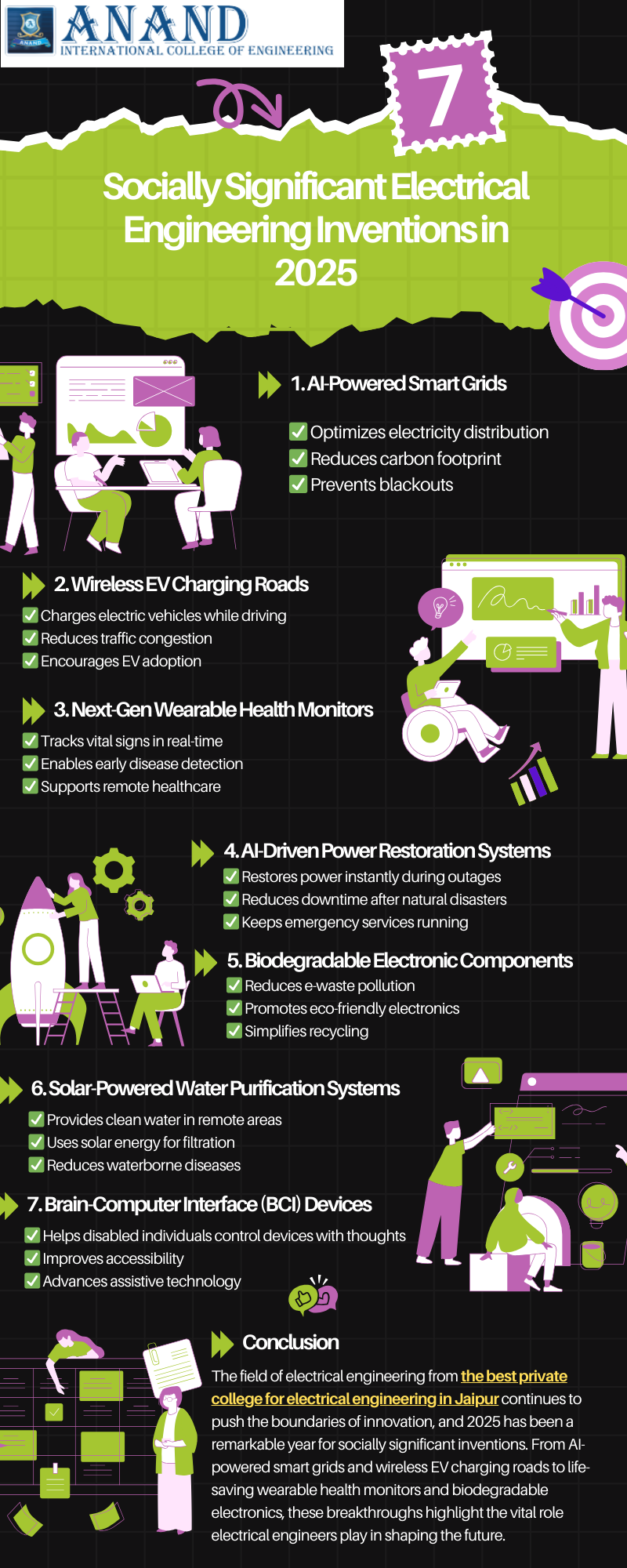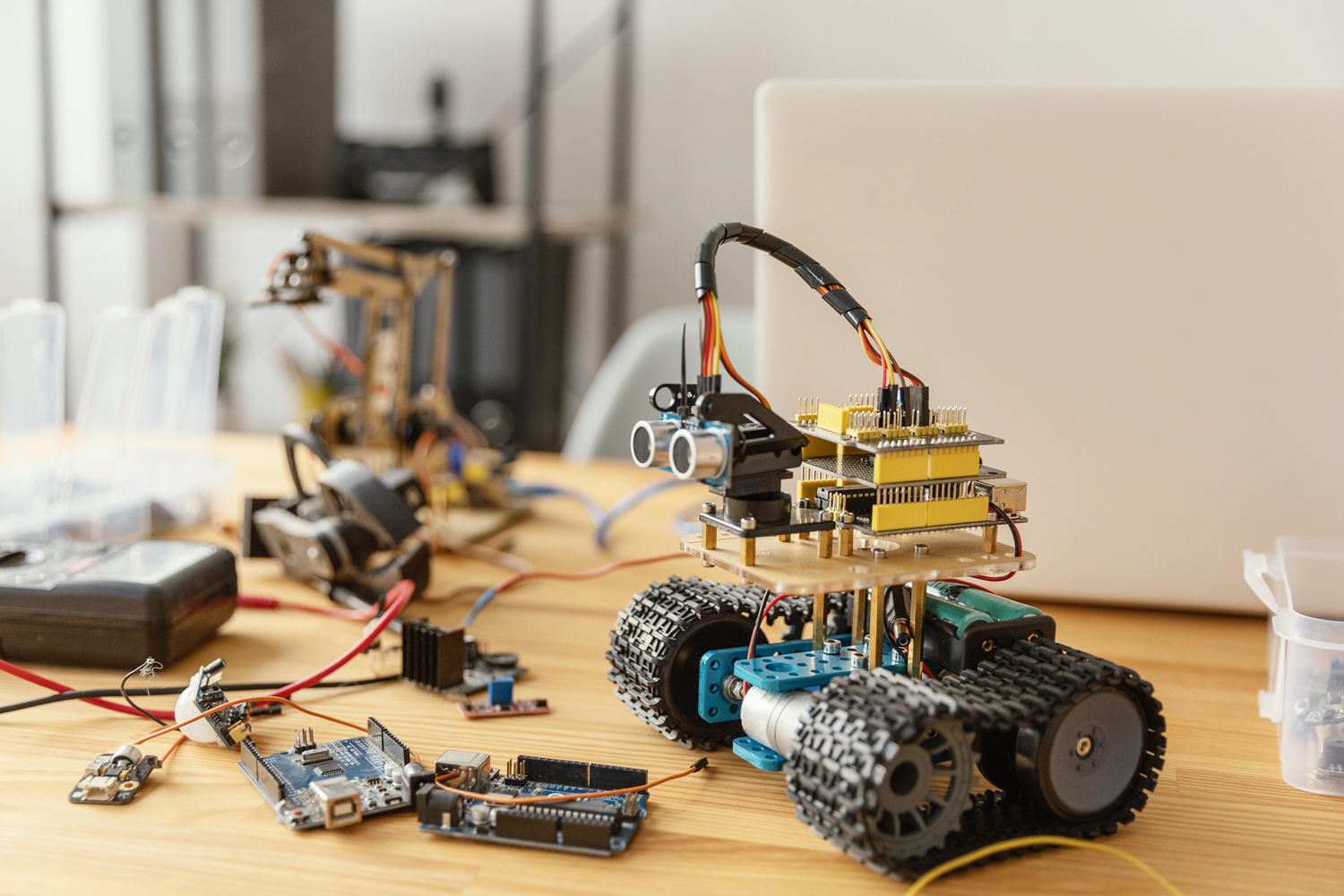Electrical engineering has always played a crucial role in shaping modern society, and 2025 has been no exception. This year, electrical engineers from the top private college for electrical engineering in Jaipur have developed groundbreaking innovations that are transforming industries, enhancing daily life, and addressing some of the world’s most pressing challenges. From sustainable energy solutions to advancements in healthcare, these inventions showcase the immense potential of electrical engineering in making the world a better place.
In this blog, we explore seven socially significant electrical engineering inventions of 2025 that are making a difference globally.
1. AI-Powered Smart Grids for Energy Efficiency
With the growing demand for electricity and the urgent need for sustainability, AI-powered smart grids have emerged as a revolutionary innovation in 2025. These smart grids use artificial intelligence and machine learning algorithms to optimize electricity distribution, reduce energy wastage, and improve power reliability.
Why It Matters:
- Reduces Carbon Footprint: Smart grids ensure optimal use of renewable energy sources like solar and wind.
- Prevents Blackouts: AI predicts demand surges and adjusts power supply accordingly.
- Enhances Affordability: Consumers benefit from lower electricity costs due to better efficiency.
Cities worldwide are implementing AI-powered grids to create more resilient and sustainable energy systems, making this one of the most socially impactful electrical engineering innovations of the year.
2. Wireless EV Charging Roads
Imagine driving your electric vehicle (EV) and having it charge automatically without needing to stop at a charging station. In 2025, electrical engineers have made this a reality by developing wireless EV charging roads using inductive charging technology.
Why It Matters:
- Encourages EV Adoption: Eliminates range anxiety, making EVs a more practical choice for consumers.
- Reduces Traffic Congestion: No more long waits at charging stations.
- Supports Sustainable Transportation: Lowers dependence on fossil fuels, reducing carbon emissions.
Several major cities have already implemented sections of wireless charging roads, leading to a significant reduction in pollution levels and an increase in EV ownership.
Also Read: The Role of AI and Electrical Engineers in Smart Home Technology
3. Next-Gen Wearable Health Monitors
Healthcare technology has taken a major leap in 2025 with the development of advanced wearable health monitors that use electrical sensors to track vital signs in real-time. These devices are capable of detecting early signs of heart disease, diabetes, and even neurological disorders like Parkinson’s disease.
Why It Matters:
- Improves Early Diagnosis: Helps detect health issues before they become critical.
- Enhances Remote Healthcare: Allows doctors to monitor patients remotely, reducing hospital visits.
- Saves Lives: Immediate alerts can prevent fatal medical emergencies.
These smart wearables have proven especially beneficial in rural areas where access to healthcare facilities is limited.
4. AI-Driven Power Restoration Systems
Natural disasters and power outages have long been a challenge, but 2025 has brought a self-repairing power grid that utilizes AI and automation. These systems detect faults, isolate affected areas, and reroute electricity within seconds, restoring power without human intervention.
Why It Matters:
- Minimizes Power Outage Impact: Critical services like hospitals and emergency response systems remain operational.
- Reduces Repair Time: Power is restored almost instantly.
- Improves Disaster Management: Helps communities recover faster from storms and earthquakes.
Countries prone to extreme weather conditions have quickly adopted this technology, making power outages a thing of the past.
5. Biodegradable Electronic Components
Electronic waste (e-waste) has been a growing concern, but electrical engineers in 2025 have developed biodegradable electronic components that break down naturally without harming the environment. These components, made from organic materials, are used in circuit boards, sensors, and even batteries.
Why It Matters:
- Reduces E-Waste Pollution: Lowers environmental damage caused by discarded electronics.
- Promotes Sustainable Manufacturing: Encourages companies to adopt eco-friendly production methods.
- Enhances Recycling Efficiency: Biodegradable components simplify waste management.
Governments and tech companies are rapidly integrating these components into consumer electronics, making technology more environmentally friendly.
6. Solar-Powered Water Purification Systems
Millions of people still lack access to clean drinking water, but in 2025, electrical engineers have introduced solar-powered water purification systems that use advanced electrical filtration methods to remove contaminants from water sources.
Why It Matters:
- Provides Clean Water to Remote Areas: Reduces waterborne diseases in underprivileged communities.
- Eco-Friendly Solution: Uses solar energy instead of fossil fuels.
- Low Maintenance and Cost-Effective: Affordable solution for developing nations.
These systems are being deployed in rural and disaster-stricken regions, significantly improving public health and quality of life.
7. Brain-Computer Interface (BCI) Devices for Disabled Individuals
In 2025, brain-computer interface (BCI) technology has reached new heights, allowing people with disabilities to control electronic devices using their thoughts. These devices, embedded with electrical sensors, help individuals operate wheelchairs, type on computers, and even communicate without speaking.
Why It Matters:
- Empowers Disabled Individuals: Enhances independence and quality of life.
- Revolutionizes Assistive Technology: Improves accessibility in workplaces and homes.
- Breakthrough in Neural Science: Opens doors for further advancements in brain-related disorders.
BCI devices are now being integrated into mainstream assistive technologies, giving millions of people newfound autonomy.
Final Thoughts
The field of electrical engineering from the best private college for electrical engineering in Jaipur continues to push the boundaries of innovation, and 2025 has been a remarkable year for socially significant inventions. From AI-powered smart grids and wireless EV charging roads to life-saving wearable health monitors and biodegradable electronics, these breakthroughs highlight the vital role electrical engineers play in shaping the future.
As technology evolves, so does its impact on society. The innovations of 2025 are not just impressive feats of engineering but also they are solutions that improve lives, protect the environment, and create a better world for future generations.


